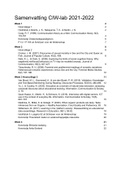Samenvatting CIW-lab 2021-2022
Week 1 2
Hoorcollege 1 2
Hoofdstuk 2 Alberts, J. K., Nakayama, T. K., & Martin, J. N. 2
Craig, R. T. (1999). Communication theory as a field. Communication theory, 9(2),
119-161 4
Kennisclip Onderzoeksparadigma’s 6
P 14 + P 195 uit Schrijven voor de Wetenschap 7
Week 2 8
Hoorcollege 2 8
Cramer, J. M. (2007). Discourses of sexual morality in Sex and the City and Queer as
Folk. Journal of Popular Culture, 40(3), 409. 8
Nabi, R. L., & Clark, S. (2008). Exploring the limits of social cognitive theory: Why
negatively reinforced behaviors on TV may be modeled anyway. Journal of
Communication, 58(3), 407-427. 9
Tukachinsky, R. H. (2008). Feminist and postfeminist readings of romantic narratives:
Heterosexual romantic experiences versus Sex and the City. Feminist Media Studies,
8(2), 181-196. 10
Week 3 Hoorcollege 3 11
Van Moort, M. L., Koornneef, A., & van den Broek, P. W. (2018). Validation: Knowledge-
and Text-Based Monitoring During Reading. Discourse Processes, 55(5-6), 480-496. 12
Yu, L. & Couldry, N. (2020). Education as a domain of natural data extraction: analysing
corporate discourse about educational tracking, Information, Communication & Society,
3- 18 14
Quan-Haase, A., Martin, K., & Schreurs, K. (2016). Interviews with digital seniors: ICT
use in the context of everyday life. Information, Communication & Society, 19(5),
691–707 15
Nadricka, K., Millet, K. & Verlegh, P. (2020). When organic products are tasty: Taste
inferences from an Organic = Healthy Association, Food Quality and Preference, 83 16
Williamson, B. (2017). Learning in the ‘platform society’: Disassembling an educational
data assemblage. Research in Education, 98(1), 59-82. 18
Hoofdstuk 3 + pagina 52 uit Schrijven voor de Wetenschap 19
Kennisclip Theoretisch kader en wetenschappelijke relevantie 20
Week 4 21
Kennisclip Ethische toetsing 21
Kennisclip Anita Eerland 22
,Week 1
Hoorcollege 1
Hoofdstuk 2 Alberts, J. K., Nakayama, T. K., & Martin, J. N.
Soorten benaderingen:
- Sociaal-wetenschappelijke benadering: kwantitatief, probeert het gedrag van
mensen te voorspellen. (Methoden zoals vragenlijsten en experimenten)
- Interpretatieve benadering: probeert gedrag in context te begrijpen, subjectief en
kwalitatief. (Methoden zoals interviews en focus-groups)
- Kritische benadering: probeert de samenleving en machtsverhoudingen binnen de
samenleving te begrijpen, kwalitatief. (Methoden zoals tekstuele analyses en media
analyses).
, Craig, R. T. (1999). Communication theory as a field.
Communication theory, 9(2), 119-161
Kennisclip 1: Onderzoeksbenaderingen in de communicatiewetenschap
Onderzoeksbenadering: een manier waarop je de wereld ziet en wat voor ideeën je over
kennis hebt, wordt ook wel een paradigma genoemd. Een paradigma, of
onderzoeksbenadering, is gebaseerd op aannames.
Binnen de communicatiewetenschap zijn er 3 paradigma’s. Deze onderzoeksbenaderingen
beschrijven het doel van het onderzoek, de kijk op realiteit en de kijk op menselijk gedrag.






